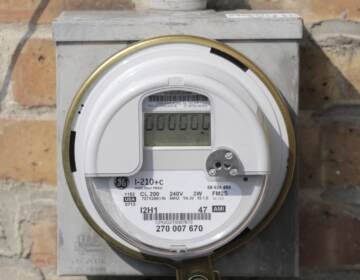New Jersey seeks to rein in rising electricity bills by increasing transparency on grid operator’s decisions
Grid operator PJM is under increasing scrutiny over rising electricity costs. Lawmakers want a clearer look at how the nonprofit operates.
Listen 1:13
High voltage electric transmission tower
This story is part of the WHYY News Climate Desk, bringing you news and solutions for our changing region.
From the Poconos to the Jersey Shore to the mouth of the Delaware Bay, what do you want to know about climate change? What would you like us to cover? Get in touch.
New Jersey is attempting to rein in rising electricity costs by pulling back the curtain on how the regional grid operator makes its decisions.
Gov. Phil Murphy signed two bills into law Friday that he said will increase transparency around decisions made by PJM Interconnection, the nonprofit that runs the electricity grid across New Jersey, Pennsylvania, Delaware and parts or all of 10 other states.
One law requires utilities in New Jersey to disclose and defend the votes they cast as members of PJM.
The other directs the New Jersey Board of Public Utilities to investigate an arcane auction PJM uses to ensure enough electricity will be available to meet future demand. That auction has cleared at record high prices the last two years, pushing up household electricity bills.
“We are committed to creating a system that is fairer and more transparent for customers and the states that represent them – a necessary change from the opaque practices that have, for too long, defined PJM,” Murphy said in a statement Friday.
PJM has come under increased scrutiny from elected officials and advocates since last year’s sky-high auction prices. An independent market watchdog that monitors PJM found the high prices were primarily driven by rising electricity demand due to the growth of data centers.
Pennsylvania Gov. Josh Shapiro filed a complaint with federal regulators late last year, claiming that PJM’s auction process itself is flawed and drives up costs for consumers without ensuring grid reliability. PJM and Shapiro then agreed to cap the auction price at close to $330 per megawatt-day — which the auction hit this year.
Shapiro, Murphy and seven other governors in the region wrote a letter to PJM earlier this summer, accusing the grid operator of failing to adequately plan for the grid’s long-term infrastructure needs and quickly connect new sources of power to the grid.
They said these “deficiencies threaten the bedrock reliability and affordability our consumers expect and deserve.”
In response to the laws signed in New Jersey on Friday, PJM accused state leaders of pointing fingers for political gain.
“We understand the political motive to shift blame for high electricity bills, but the fact remains: PJM operates as a not-for-profit that plans the power grid and administers federally regulated wholesale electricity markets,” PJM spokesperson Jeff Shields said in a statement. “Pointing fingers will not solve the supply-and-demand realities driving higher prices for consumers in New Jersey, including challenges that stem from failed policies. Our focus remains on working toward real solutions, because New Jerseyans deserve nothing less.”
PJM declined to specify which “failed policies” it was referring to. But in May, Shields told WHYY that the shrinking supply is due primarily to policies that promote decarbonization, which he said led to closures of older fossil fuel power plants.
Forcing utilities to disclose their votes
Electricity generators, grid infrastructure owners, utilities and their parent companies can help shape PJM’s policies by participating in a web of stakeholder task forces and committees that ultimately advise PJM’s governing board.
These stakeholders can cast votes in some of these committees by paying to become voting members of PJM. For example, in the past year members have voted on issues including the hours during which electricity customers can be paid to reduce their electricity use and how far in advance power plants must tell PJM they plan to retire, Shields said.
Some stakeholder votes — including those taken in the “most senior” committee that directly advises the board — are already public, according to PJM. But votes taken in lower committees are merely published as aggregated results, rather than broken down member-by-member.
The bill signed into law Friday requires New Jersey electric utilities and their business affiliates to report their votes to the state’s Board of Public Utilities yearly, regardless of whether PJM already makes these votes public. They’ll need to specify whether each vote “furthers the State’s goals of prioritizing the affordability, reliability, and sustainability of electricity production, consumption, and conservation,” according to the bill.
“There’s this perception of a conflict of interest,” said Assemblyman David Bailey Jr., a Democrat representing Cumberland, Gloucester and Salem counties. “That’s really what the bill gets to — just providing additional information and investigating the processes here, and making sure that we have answers to these questions, that there aren’t conflicts of interest or that we can have full trust in the process.”
Brian Lipman, director of New Jersey’s Division of the Rate Counsel, which represents ratepayers, wrote in a press release that PJM has operated “behind the scenes” for too long.
“Our electric companies are all part of larger organizations,” he said. “It is important to ensure that when our electric companies are voting at PJM, they are doing so to benefit New Jersey customers and not the interests of their parent corporations.”
Brian Ahrens, a spokesperson for Atlantic City Electric, said the company is still reviewing the laws and remains “committed to working together with elected and regulatory officials, PJM, other utilities, and generators to be part of a path forward that supports the area’s growing energy needs and manages bill impacts, while continuing to provide safe, reliable and resilient energy.” Ahrens pointed to a new customer relief fund meant to help lessen the impact of rising bills on families.
JCP&L declined to comment. Neither PSE&G nor Consolidated Edison, Inc., which owns Rockland Electric Company, provided a comment by the time of publication.
Investigating PJM’s reliability auction
The second piece of legislation Murphy signed Friday directs New Jersey’s Board of Public Utilities to investigate whether PJM’s annual capacity auction is “serving its intended design to obtain resource adequacy at the lowest possible cost.”
The board must report its findings to the governor and state legislature within a year.
Most customers in the PJM region will likely see their electricity bills rise 1.5% to 5% as a result of the most recent capacity auction, PJM said. That’s in addition to bill increases still phasing in from last year’s auction.
Higher auction prices are intended to jumpstart the development of new power plants, which could in turn fix the supply and demand problem and bring prices back down. But critics say PJM thwarts these market forces by being slow to approve new sources of power.
“We have great reliance on PJM to get the very best price they can get,” said Democratic state Sen. John Burzichelli, who represents Cumberland, Gloucester and Salem counties. “Clearly, in that particular auction cycle, something went sideways, and the rate payers were held hostage.”
“We’d like to know more about how they conducted themselves,” he added.
PJM has been working to update its interconnection process to get new generation projects connected faster, including by analyzing projects in batches rather than one by one, prioritizing projects that can start operating fastest and using artificial intelligence to streamline the interconnection process.

Get daily updates from WHYY News!
WHYY is your source for fact-based, in-depth journalism and information. As a nonprofit organization, we rely on financial support from readers like you. Please give today.







